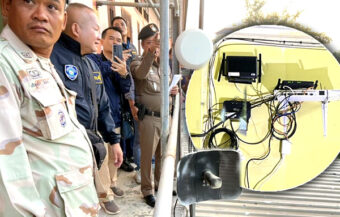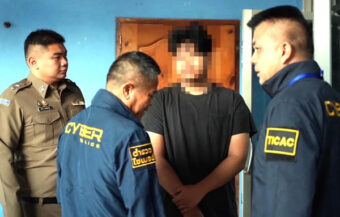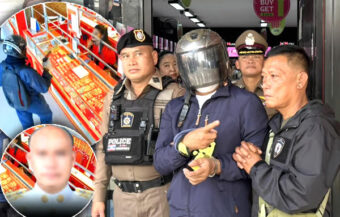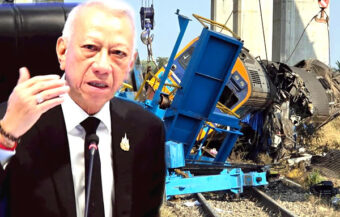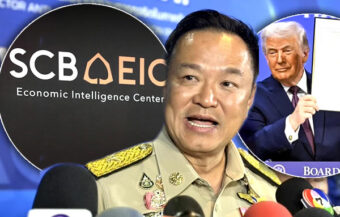PM Anutin Charnvirakul is reportedly weighing an early House dissolution as mounting scandals, ongoing investigations and the rising threat of a no-confidence vote put his government at risk, fueling intense speculation of a snap General Election in Thailand.
Prime Minister Anutin Charnvirakul returned to Bangkok this weekend after a high-profile trip meeting US President Donald Trump and China’s Xi Jinping. Since then, rumours of an early parliamentary dissolution and snap General Election have been spreading fast. The government faces mounting emerging controversies on multiple fronts, raising the real prospect of a no-confidence motion it could easily lose. If that happens, an early election would be all but inevitable. At this pace, Anutin’s administration could become the shortest-lived in modern Thai history.
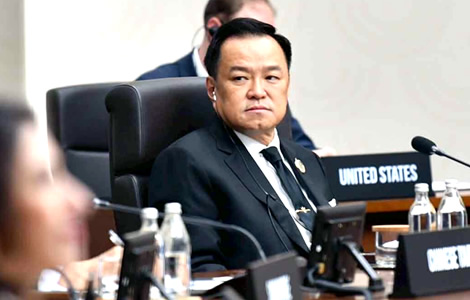
Speculation is intensifying in Bangkok that Prime Minister Anutin Charnvirakul may dissolve parliament sooner than expected. Analysts suggest he could call an early general election to regain control of the political agenda. The interim government is under pressure on multiple fronts, which complicates coalition management and legislative priorities. Furthermore, recent events have heightened scrutiny of the administration and its handling of crises.
A major source of concern is the ongoing scammer crisis. Almost daily, reports surface showing financial infiltration from Cambodian scam centres into Thailand.
Investigators suggest that networks tied to grey capital and pernicious industries continue to operate despite coordinated government action.
Authorities intervene as scammer networks continue to pose threats across Thailand from Cambodia
Consequently, the Prime Minister and police authorities have stepped in, yet significant exposure risks remain for individuals connected to these schemes. Meanwhile, officials in Cambodia are cooperating, but the scale of the problem continues to grow.
At the same time, the upper house of the Senate faces increasing controversy. Last week, over 130 senators filed an ethics complaint against Senator Nantana Nantawaropas. She is a respected minority senator who has long campaigned for democratic reforms.
The complaint followed her remarks criticising a bloc of more than 130 ‘blue line’ senators linked to the Bhumjaithai Party. She labelled one member of the group a ‘pork seller,’ which inflamed tensions within the chamber.
Subsequent investigations revealed that the ethics complaint may relate to potential conflicts in the senator’s election. For instance, the targeted senator, described as a ‘pork seller,’ may have been elected on the wrong panel. This has sparked debate about fairness, as more serious alleged wrongdoing by other senators has not been addressed. Therefore, critics argue that accountability is uneven, fostering the perception of naked prejudice in the upper house.
Senate ethics complaint raises questions over fairness and uneven accountability among blue line senators
Meanwhile, the Election Commission has faced criticism for inaction. An ongoing investigation into the 2024 Senate election remains unresolved. Specifically, at least 229 individuals, including upper house senators and potentially Prime Minister Anutin himself, are implicated.
However, the Election Commission has yet to finalise its findings and initiate court action. As a result, political tension and opposition pressure continue to grow, creating a volatile environment for the government.
In response, the People’s Party has threatened a no-confidence motion against the government, particularly over concerns relating to the scammer crisis and compromised MPs and even ministers.
Additionally, the newly reorganised Pheu Thai Party has issued similar warnings. On Friday, Pheu Thai appointed Julapun Amornvivat as their new leader. This move signals readiness to challenge the administration, as well as a determination to capitalise on government vulnerabilities. Political analysts argue that a no-confidence motion could immobilise legislative progress and stall constitutional reform.
Election threats mount as opposition parties prepare no-confidence motions and capitalise on scandals
Bhumjaithai Party leaders are reportedly keen to avoid prolonged parliamentary confrontation. They claim that a drawn-out debate could dominate media coverage and expose weaknesses before the electorate.
Furthermore, a successful no-confidence vote could topple the government, while an unlikely failure, given the opposition’s numbers, could still weaken its public perception and delay reforms. Therefore, the party is evaluating its strategy to mitigate these risks while preserving political advantage. In short, that means using the Prime Minister’s power to dissolve the House of Representatives.
Constitutional reform remains a significant concern. Opposition sources now suggest that the current government lacks the political will to push for a new charter. This persists despite the Memorandum of Understanding signed in early September between the People’s Party and the Bhumjaithai Party.
Critics warn that without decisive action, the resulting framework may be more restrictive than the 2017 charter. Consequently, it could favour entrenched, non-democratic forces and limit civil liberties, which could hinder effective governance.
Bhumjaithai weighs political risks as constitutional reform delays raise fears of an undemocratic framework
Timing has emerged as a crucial factor. Dissolving parliament before a no-confidence debate could allow Mr Anutin to control the electoral narrative. By calling an early election, the government could preempt opposition attacks and manage media coverage. In addition, early dissolution could allow Bhumjaithai to highlight policy successes and focus on voter engagement, rather than prolonged legislative controversy.
Mr Anutin, who assumed office in September following a surprise parliamentary realignment, faces a delicate balancing act. His coalition must navigate governance responsibilities while preparing for an election expected around March next year.
Analysts suggest that avoiding a no-confidence debate could project confidence, decisiveness, and administrative stability to the electorate.
Government insiders argue that Mr Anutin will not allow his short administration to become a political punching bag. “There is no reason to let the opposition drag the government through a week-long debate,” said one Bhumjaithai strategist on condition of anonymity. He added, “Dissolving the House would reset the narrative and allow the party to campaign from a position of strength.”
Early election strategy could allow Prime Minister to control narrative and prevent opposition leverage
Supporters say an early election prevents the opposition from exploiting weaknesses. No-confidence debates in Thailand are highly publicised, often influencing public opinion even without definitive proof of wrongdoing.
Consequently, unproven allegations of incompetence or corruption can significantly sway voters. By acting early, Bhumjaithai could protect its populist record on rural infrastructure and cannabis decriminalisation while framing the narrative on governance and stability.
Coalition dynamics also play a role. Small parties and partners may fear electoral losses if a no-confidence debate undermines their standing. In particular, the Kla Tham Party, headed by Minister of Education Narumon Pinyosinwat and Deputy Prime Minister Thamanat Prompow, could become a target.
Thus, dissolving the House early could rally coalition members, safeguard ministerial positions and maintain patronage networks. Observers say that well-timed election calls strengthen alliance cohesion and increase negotiating leverage before the polls.
Dissolving the House early may secure coalition unity, preserve ministers and block public scrutiny
However, critics warn of potential downsides. Early dissolution may appear as evasion, damaging public trust. “Mr Anutin risks being accused of avoiding accountability,” said Wanwichit Boonprong, a political analyst at Rangsit University.
Moreover, avoiding the debate could reinforce opposition narratives of a fragile, untransparent government. A no-confidence debate, although risky, provides a public platform to defend policy and assert competence.
Opposition parties are reportedly preparing to target perceived irregularities in cabinet appointments, delays in drought-relief programs, and mismanagement of fuel subsidies. These issues resonate strongly with rural voters, who remain crucial to election outcomes. Therefore, timing the election could determine whether such criticisms gain traction or are mitigated through strategic messaging.
Thailand’s constitution grants the Prime Minister discretion to dissolve the House. Historical precedent shows leaders have used this authority strategically. Thaksin Shinawatra in 2005 and Prayut Chan-o-cha in 2019 are cited examples of timing benefiting incumbents. Thus, controlling the electoral calendar is considered a legitimate and essential aspect of leadership rather than just avoidance of scrutiny.
Public opinion and precedent make timing a key factor in deciding on an early election for advantage
Public opinion factors heavily into decision-making. Recent polls place Bhumjaithai’s support at 20–25%, roughly on par with Pheu Thai in key provinces.
Analysts argue that early elections could prevent the opposition from fully mobilising and allow Bhumjaithai to capitalise on provincial networks. The Northeast and lower Central Plains remain strongholds, which could reinforce the party’s advantage as an incumbent.
Momentum remains critical. Entering the campaign with stability allows the party to project leadership, rather than performing damage control. Government sources insist the decision is strategic, focusing on electoral advantage rather than avoidance. Choosing when to dissolve the House is seen as a calculated step to preserve influence and limit risk.
If the opposition proceeds with a no-confidence motion, Mr Anutin faces a stark choice. A House dissolution would cut short his four-month term, the shortest premiership in recent Thai history. However, it could prevent a protracted parliamentary confrontation that might erode electoral prospects. Analysts say the decision will hinge on public sentiment, party readiness and opposition tactics.
PM faces critical decision as early dissolution could avert no-confidence vote and protect administration
The political calendar remains fluid. Any signs of an impending no-confidence motion could trigger rapid action. Observers expect Mr Anutin to act preemptively, rather than endure a week of televised attacks that could undo months of political positioning. Government aides stress that timing is about selecting the battlefield, not avoiding scrutiny.
Shocking intel emerges at parliamentary hearings on Thursday on the Cambodian scam centre crisis
Evil and misery caused by scam centre compounds in Myanmar and Cambodia must be urgently lanced
The broader context highlights Thailand’s democratic and governance challenges. Delays in constitutional reform, ongoing investigations and ethical disputes and potential legal action related to the upper house highlight tensions between political strategy and accountability. Analysts warn that missteps could compromise institutional integrity and erode public confidence in governance.
The next election looms as a test for both the government and the opposition. Undoubtedly, it will be hard fought and bruising. Analysts note that voters will respond not only to policy performance but also to perceived decisiveness, integrity and competence. Indeed, opinion polls show a public very disturbed and confused by events since June this year.
Join the Thai News forum, follow Thai Examiner on Facebook here
Receive all our stories as they come out on Telegram here
Follow Thai Examiner here
Further reading:
Shocking intel emerges at parliamentary hearings on Thursday on the Cambodian scam centre crisis
PM Anutin asks the Chinese to produce intelligence on the scammer gangs threatening the country
Prime Minister Anutin Charnvirakul’s government faces new claims of alleged Cambodian scam links
High powered, secretive meeting chaired by PM agrees robust action against Cambodian networks
Thailand and Cambodia face danger from ‘Dragon Head’ the Chinese mafia leader behind the scams
Cyber police and Money Laundering agency seek UK and US co-operation targeting Cambodian networks
United States, South Korea and United Kingdom act against Cambodian scam industry with Thai tie-ins


